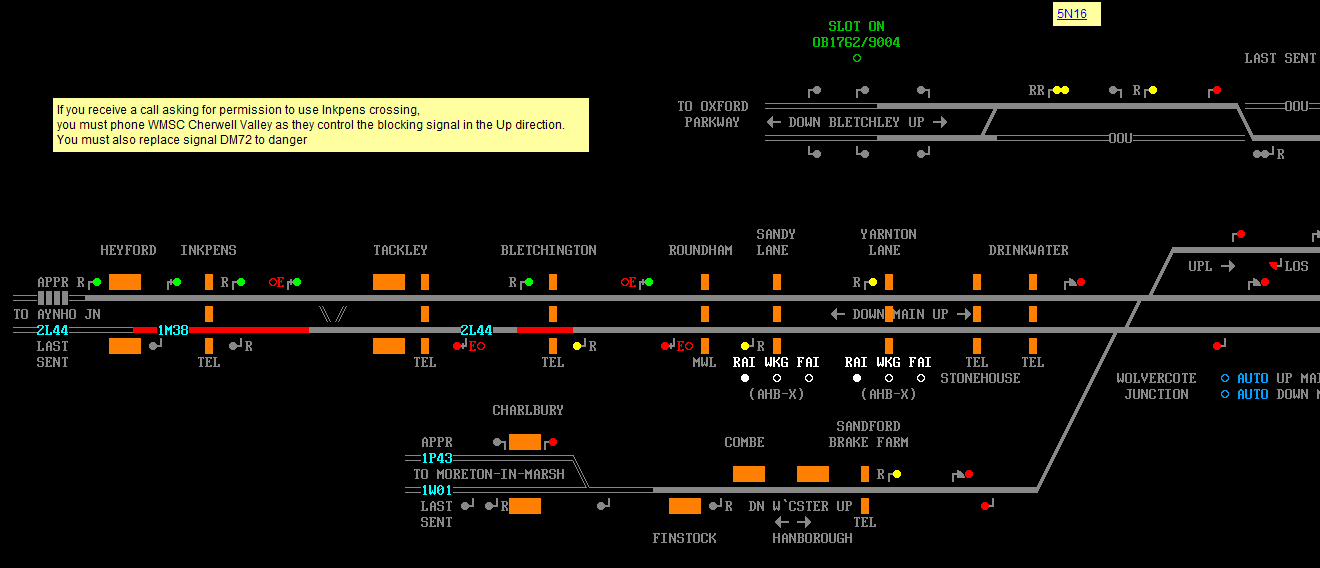Page 1 of 1
| Last Train Sent 03/07/2018 at 21:31 #110042 | |
|
ajax103
1128 posts |
I'm enjoying playing Oxford 2016 era at the moment and rather amusely it seems that one train has managed to leap frogged another on a two track section of railway or not as the case is. The sim says that I have just had 2L44 pass Aynho Junction in the Banbury direction yet looking at the sim, 2L44 is still behind 1M38 so has the sim actually got the two confused? Apart from that, I'm really enjoying Oxford so thank you to whoever is responsible!  Post has attachments. Log in to view them. Log in to reply |
| Last Train Sent 03/07/2018 at 21:38 #110043 | |
|
headshot119
4871 posts |
2L44 is the Last train you sent. Last Sent berths generally populate when passing the last point of no return.
"Passengers for New Lane, should be seated in the rear coach of the train " - Opinions are my own and not those of my employer Log in to reply |
| Last Train Sent 03/07/2018 at 23:38 #110047 | |
|
ajax103
1128 posts |
But it isn't, the last train I sent or will send is the Class 1 - if you look carefully you see the "last train sent" is actually behind the Class 1. Me thinks the Sim is confused.... Log in to reply |
| Last Train Sent 03/07/2018 at 23:44 #110048 | |
|
JamesN
1626 posts |
ajax103 in post 110047 said:But it isn't, the last train I sent or will send is the Class 1 - if you look carefully you see the "last train sent" is actually behind the Class 1. The last train that you sent past the point of no return is the 2Lxx... Log in to reply |
| Last Train Sent 03/07/2018 at 23:48 #110049 | |
|
postal
5331 posts |
ajax103 in post 110047 said:Me thinks the Sim is confused....Well there is obviously some confusion about what "Last Sent" actually means in signalling parlance. “In life, there is always someone out there, who won’t like you, for whatever reason, don’t let the insecurities in their lives affect yours.” – Rashida Rowe Log in to reply |
| Last Train Sent 04/07/2018 at 04:54 #110050 | |
|
GeoffM
6412 posts |
postal in post 110049 said:ajax103 in post 110047 said:Literally the last [TD] sent to the neighbouring box. The first TD is already under their control; the following train is in their approach berth so has been sent more recently.Me thinks the Sim is confused....Well there is obviously some confusion about what "Last Sent" actually means in signalling parlance. https://wiki.openraildata.com/index.php/TD_Berths Some boxes transmit even earlier. No biggie, even if it looks odd. SimSig Boss Log in to reply |
| Last Train Sent 04/07/2018 at 10:33 #110051 | |
|
kbarber
1779 posts |
GeoffM in post 110050 said:postal in post 110049 said:In the 1949 boxes between Liverpool Street and Gidea Park the description would be sent before a train even passed the box if a route was set all through for it. All boxes had 1st, 2nd & 3rd approaching berths (and there may have ben some blind storage as well in some cases). Where routes were set in auto, transmission would happen regardless of the aspects of intervening signals. So it was perfectly possible to have a train still not out of the ocntrol area (certainly not betond a 'point of no return'ajax103 in post 110047 said:Literally the last [TD] sent to the neighbouring box. The first TD is already under their control; the following train is in their approach berth so has been sent more recently.Me thinks the Sim is confused....Well there is obviously some confusion about what "Last Sent" actually means in signalling parlance.  yet the 'last sent' berth would show the description of the train behind it. (Given that sort of automatic describing equipment was rather new technology in 1949, it also indicated when a description had been sent early in that way - a white visual came up alongside the description when it was predescribed to the box ahead and stayed with it into the 'last sent' berth. There was at least one accident - at Bethnal Green - where that feature assured the S&T that routes had been propperly set all through the signalbox area - the predescription couldn't have happened otherwise.) yet the 'last sent' berth would show the description of the train behind it. (Given that sort of automatic describing equipment was rather new technology in 1949, it also indicated when a description had been sent early in that way - a white visual came up alongside the description when it was predescribed to the box ahead and stayed with it into the 'last sent' berth. There was at least one accident - at Bethnal Green - where that feature assured the S&T that routes had been propperly set all through the signalbox area - the predescription couldn't have happened otherwise.)The reason for doing it is to ensure the receiving signalman gets sufficient notice of approaching trains to be able to make regulating decisions. As Geoff says, it may look odd until you're used to it and understand what it's all about, but in fact it's perfectly logical in signalling terms. Log in to reply The following users said thank you: TUT, GeoffM |